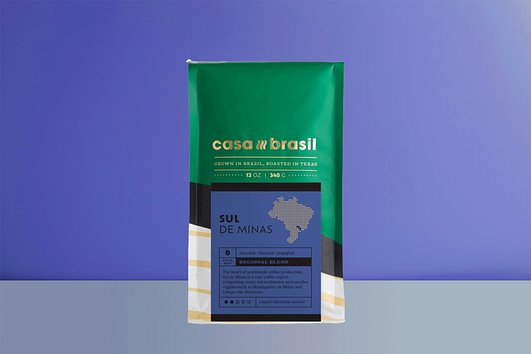Guide to Brazilian Coffee
![]() Maryna Gray
• March 26, 2021 — last updated June 14, 2021
Maryna Gray
• March 26, 2021 — last updated June 14, 2021
Did you know Brazil is the world's largest coffee supplier? Read on to learn the history of Brazilian coffee and why the Brazilian coffee industry continues to boom.

The Legend of Brazilian Coffee
The first coffee planted in Brazil begins with a scandal. According to legend, Francisco de Melo Palheta traveled to French Guiana on a diplomatic mission and ended up seducing the governor’s wife in an attempt to get his hands on the valuable local coffee crop. His plan worked. The governor's wife sent Francisco back to Brazil with coffee seeds hidden in a bouquet of flowers. When he returned home, he planted the coffee seeds and the first coffee plants were born, the beginning of a rich coffee history in Brazil.
Brazilian Coffee Production
Coffee production began around the Paraiba River, near Rio de Janeiro. This location was not only ideal for the land, but also the proximity to the city for export. Unlike the small coffee farms of Central America, the first commercial farms in Brazil were large plantations operated by slaves. This industrialized method of coffee production was fairly uncommon for the rest of the world. Between 1820 and 1830, coffee production in Brazil was booming and breaking its way into the global market. The people leading coffee production were known as ‘coffee barons’ and were extremely wealthy and powerful. Their demands had great pull in government policies and shaped how the government supported the coffee industry. In 1888, slavery was abolished in Brazil and many feared there would be a significant decline in coffee production. However, the harvest continued to be successful year after year.
Burn the Coffee
In the 1920s, Brazil was producing 80 percent of the world’s coffee. Sales from coffee financed a large amount of infrastructure in the country. The strength of production became an issue when the large surplus of coffee combined with the Great Depression in the 1930s led to a huge drop in world demand. In an effort to ignite coffee prices, Brazil’s government burned around 78 million bags of stockpiled coffee. This effort didn’t pay off as they had hoped.
Brazilian Coffee Today
Today, Brazil is the most advanced and industrialized coffee producer in the world. It supplies about 40 percent of coffee production worldwide: for reference, this is about twice as much as Vietnam, the second largest producer. The drink is very popular in Brazil and is the most consumed product by individuals over 10. Brazilian coffees are often low in acidity, with a sweet, heavy body. The tasting notes in Brazilian coffee draw on chocolate and nutty flavors and are known to produce a very clean cup.
We want to help you make better coffee at home. Our recommendations are our own, and never sponsored. If you see something you love and buy it through our links, we may receive an affiliate commission (thanks for that!).





